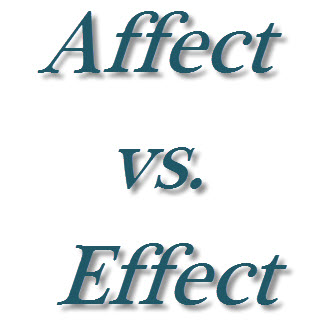

travels to all parts of the body including the brain.passes into your blood through the walls of the stomach and small intestine.have a lower percentage of muscle on your body.How alcohol affects you can depend on a range of factors, including your:Īlcohol can affect you more quickly if you:

If you think of affect as the verb and effect as the noun, most of the time you’ll be using the word you want.On this page It’s different for each person His affect did not change after hearing the newsīut exceptions aside, just stick to the basics: Although its use is primarily found in psychology, the noun affect refers to an observable emotional response.

The strike effected change within the companyĪffect can be a noun. As a verb, effect generally means "to cause to come into being" or "accomplish." There are, however, a few relatively uncommon exceptions, and these are worth knowing about.Įffect can be a verb. The law goes into effect next week A Few Rare Exceptions He added a scarf to the outfit for effect He affected a French accent ’Effect’ as a NounĪs a noun, an effect is "a change that results when something is done or happens," or "a particular feeling or mood created by something." Trying not to let emotions affect their decisionĪffect also has a sense meaning “to put on a false appearance of (something).” ‘Affect’ as a VerbĪffect, when used as a verb, means "to act on or change someone or something."Ĭonstruction will affect traffic in the area The basic difference is this: affect is usually a verb, and effect is usually a noun. Affect is usually a verb meaning "to produce an effect upon," as in "the weather affected his mood." Effect is usually a noun meaning "a change that results when something is done or happens," as in "computers have had a huge effect on our lives." There are exceptions, but if you think of affect as a verb and effect as a noun, you’ll be right most of the time.Īffect and effect are two of the most commonly confused words in English, but don’t worry-we’ll help you keep them straight.


 0 kommentar(er)
0 kommentar(er)
